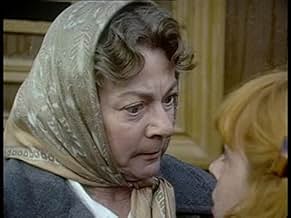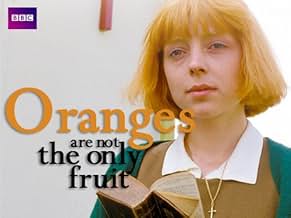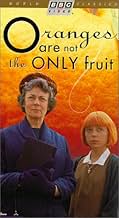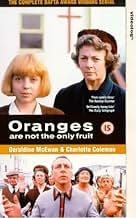Oranges Are Not the Only Fruit
- TV Mini Series
- 1989–1990
- 2h 45m
IMDb RATING
7.7/10
1.2K
YOUR RATING
Jessica, raised in a fanatical cult, endures brainwashing until her forbidden relationship with Melanie opens her eyes. They face cruel treatment for their 'unnatural' bond, but Jessica's sp... Read allJessica, raised in a fanatical cult, endures brainwashing until her forbidden relationship with Melanie opens her eyes. They face cruel treatment for their 'unnatural' bond, but Jessica's spirit overcomes the oppressive teachings.Jessica, raised in a fanatical cult, endures brainwashing until her forbidden relationship with Melanie opens her eyes. They face cruel treatment for their 'unnatural' bond, but Jessica's spirit overcomes the oppressive teachings.
- Won 3 BAFTA Awards
- 10 wins & 6 nominations total
Browse episodes
Featured reviews
I have been watching a lot of my old favourites recently and I can't heap enough praise on this adaptation. I'm not a great reader, but this bbc show was just brilliant. The acting, everything. Geraldine McEwan and Charlotte Coleman were both outstanding. The first episode was so funny and endearing, the soundtrack happy and upbeat, a young Emily Aston just lovely, but you knew darker things were to come, how could they not? People don't like to see others happy when they are miserable themselves it seems. I think every school syllabus should have had a book like this included instead of the usual boring heteronomative drivel I was forced to read waay back in the 80's when I was struggling with my sexuality myself. Brilliant show back then and is just as brilliant today.
Because the filmmakers obviously tried to make a close adaptation of Jeanette Winterson's semi-autobiographical novel, as an avid Winterson fan, I cannot help comparing the film with the book. It would be extremely challenging to preserve Winterson's unique, postmodern literary quality in the adapted film.
In the original novel, Winterson objectively examines coming-of-age experiences of an orphan who is adopted to evangelist parents and finds herself a lesbian. The objectivity remains in the film to some extent; a lot of dramatic happenings are quietly described and never get emotional. However, the nature of the film media inevitably forces the audience to identify themselves with protagonist Jess. The analytical aspect of reading Winterson is lost, and if compared, the film just follows the plotline more plainly than the novel does.
Aside from Winterson, the film is a decently executed prototypical British film, on the tradition of British New Wave and Channel 4 productions, and worth watching.
In the original novel, Winterson objectively examines coming-of-age experiences of an orphan who is adopted to evangelist parents and finds herself a lesbian. The objectivity remains in the film to some extent; a lot of dramatic happenings are quietly described and never get emotional. However, the nature of the film media inevitably forces the audience to identify themselves with protagonist Jess. The analytical aspect of reading Winterson is lost, and if compared, the film just follows the plotline more plainly than the novel does.
Aside from Winterson, the film is a decently executed prototypical British film, on the tradition of British New Wave and Channel 4 productions, and worth watching.
I read the book, and loved it, having to give it back to the library before the Easter long- weekend left me little to do, so after some searching (albeit mainly on YouTube) found this adaptation.
This adaptation was written by Winterson herself, so I expected it to be good, and it was. The acting was tremendous and it stayed quite faithful to the book, as you would expect. Some have accused this adaptation over being over-dramatic and over-exaggerated , particularly with the portrayal of the church and the character of Jeanette's (who in the adaptation is now called Jessica) mother, and to an extent it is, but I feel that this was how it was written in the book and so is fair enough.
Where it fails, however, is that it clearly bears the scars of the transition from page to screen. Mainly through how the cutaway fairy-tales that, whilst about different characters, are significant and relevant in their themes to the main story, are cut out. This was particularly sad for me as I was eager to see how this would be done. The most likely explanation is that this would cut down the adaptation to a happy three-parter, so could this be understandable?
This adaptation was written by Winterson herself, so I expected it to be good, and it was. The acting was tremendous and it stayed quite faithful to the book, as you would expect. Some have accused this adaptation over being over-dramatic and over-exaggerated , particularly with the portrayal of the church and the character of Jeanette's (who in the adaptation is now called Jessica) mother, and to an extent it is, but I feel that this was how it was written in the book and so is fair enough.
Where it fails, however, is that it clearly bears the scars of the transition from page to screen. Mainly through how the cutaway fairy-tales that, whilst about different characters, are significant and relevant in their themes to the main story, are cut out. This was particularly sad for me as I was eager to see how this would be done. The most likely explanation is that this would cut down the adaptation to a happy three-parter, so could this be understandable?
10Tybalt-3
In my opinion, the finest movie ever made for television. Charlotte Coleman and Geraldine McEwan are magnificent.
I stumbled upon this movie quite by accident when it was shown in 1990 or 1991 on A&E in Canada, and I stayed up all night to watch it again. I bought Jeanette Winterson's book the next day and have loved it ever since.
I stumbled upon this movie quite by accident when it was shown in 1990 or 1991 on A&E in Canada, and I stayed up all night to watch it again. I bought Jeanette Winterson's book the next day and have loved it ever since.
Magnificently crafted film involving a young adopted girl's coming of age, under the authority of her priggish and religiously fanatical mother. At times, moving, stark and horrifying. It also portrays wonderful strength in the face of adversity, and the extraordinary power of being able to forgive. The acting is first rate, all the way around, and the end truly left me wishing that a sequel had been on tap.
Did you know
- TriviaBased on the book, "Oranges Are Not the Only Fruit" by Jeanette Winterson.
- Quotes
Pastor Finch: These are the bonds of love.
- ConnectionsFeatured in A Bit of Scarlet (1997)
- How many seasons does Oranges Are Not the Only Fruit have?Powered by Alexa
Details
- Release date
- Country of origin
- Language
- Also known as
- Orangen sind nicht die einzige Frucht
- Filming locations
- Accrington, Lancashire, England, UK(Panoramic view from hilltop monument)
- Production company
- See more company credits at IMDbPro
Contribute to this page
Suggest an edit or add missing content































